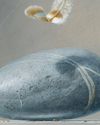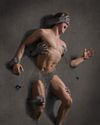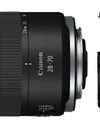
THE MISSION
Change the look of out-of-focus highlights in your images by creating your very own bokeh template to stick on the lens
Time needed
One hour
Skill level
Advanced
Kit needed
• Various household items (see right)
• Black card
• A 35mm, 50mm or 85mm prime
If you’ve held an interest in photography for some time you’ve probably come across the term ‘bokeh’ before. It’s a word of Japanese origin that’s used to describe out-of-focus specular highlights in the background of your shots, usually in portraits taken with wide apertures.
The shape of your bokeh is determined by the shape of your aperture, which will be circular if the aperture is made up of enough blades. However, lenses, such as Canon’s original EF 50mm f/1.8 ‘nifty-fifty’ lens, use a five-sided aperture ring. This gives bokeh a distinctive pentagonal look. Some people prefer the circular bokeh shapes, and perhaps that’s why the latest EF 50mm f/1.8 STM version has a seven-bladed aperture to smooth this out and give it a more circular look.
When you shoot at your widest maximum aperture value, such as f/1.8, you move the aperture blades totally out of the way, so the bokeh shape becomes circular, as it’s then defined by the circular lens barrel. In our fun technique this month we’re going shoot wide open, but add our own aperture shape, or pattern, to the front of the lens. This will transform the shape of the out-of-focus highlights in the image.
This story is from the June 2020 edition of PhotoPlus : The Canon Magazine.
Start your 7-day Magzter GOLD free trial to access thousands of curated premium stories, and 9,000+ magazines and newspapers.
Already a subscriber ? Sign In
This story is from the June 2020 edition of PhotoPlus : The Canon Magazine.
Start your 7-day Magzter GOLD free trial to access thousands of curated premium stories, and 9,000+ magazines and newspapers.
Already a subscriber? Sign In

The Art of Copying Art - James Paterson shows you how to use your Canon gear to capture artwork and paintings the right way with simple camera and lighting skills
Whether you want to capture a painting like the above, digitise old prints or reproduce any kind of canvas, there's real skill in capturing artwork with your camera. Not only do you need the colours to be accurate, you also need to master the spread, angle and quality of the light to minimise glare and show the work at its best.This painting by the artist Bryan Hanlon has a wonderfully subtle colour palette. To reproduce the painting in print and digital form, it needs to be captured in the right way.

Fright night
Canon photographer and digital artist Alexander loves to craft incredible fantasy scenes with a spooky horror twist

Sharpen your shots with DPP
Sharpening a digital image also increases contrast at the edge of details

CANON ImagePrograf PRO-1100
Deeper blacks, better bronzing, greater lifespan and 5G Wi-Fi -Canon's new printer is full of new tech, says

Canon's new 'kit lens' is actually a half-price f/2.8 trinity lens!
The Canon RF 28-70mm F2.8 IS STM lacks a red ring, but borrows premium features from its L-series siblings

DREW GIBSON
Pro motorsports photographer Drew on why he hasn't (yet) switched to Canon's mirrorless system, why old-school techniques can be the most reliable, and the lessons learned from more than a decade shooting the world's biggest car brands

Up in smoke
Make a smoky shape in Affinity Photo and get to grips with the amazing Liquify Persona under the guidance of James Paterson

Expand your creativity with Generative Fill
Photoshop's Al-powered feature brings revolutionary new tools to image editing. James Paterson reveals all...

Turn your images into vintage postcards
Wish you were here? Sean McCormack explains how you can give your summer photographs a vintage postcard look

The Angel Malibu
Light painting an American movie producer in the Wadi Rum Desert in Jordan was a highly unlikely evening out for David!